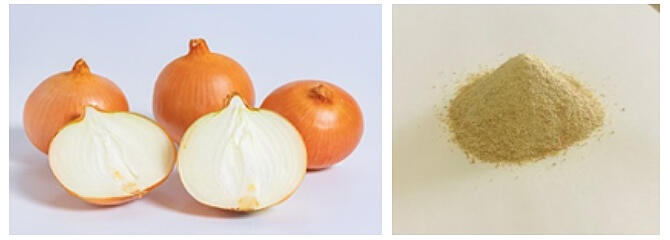Onions may help improve cognitive decline experienced before and after the onset of dementia. A research group led by Professor Toshiyuki Nakagawa of the Graduate School of Medicine at Gifu University, in collaboration with the National Agriculture and Food Research Organization (NARO), Hokkaido Information University and their collaborators, has demonstrated that individuals who consumed quercetin-rich onion powder had significantly higher scores in writing than those who consumed onion powder without quercetin. The results were published in the July 21, 2023, online edition of the international journal Heliyon.

Right: The test food quercetin-rich onion powder (daily intake was 11g (50mg as quercetin aglycone))
Provided by Gifu University
Responding to the rise in aging-related dementia is a pressing issue in Japan, where the population is aging rapidly. Symptoms of dementia include "core manifestations" (e.g., memory loss) and "peripheral symptoms" (i.e., mental and behavioral traits). Behavioral symptoms include wandering, violence, depression and hallucinations. In particular, the current finding by the research group suggest that a quercetin-rich diet is expected to reduce behavioral symptoms and cognitive decline.
Quercetin-rich onion powder (test food) or quercetin-free onion powder (placebo food) was heated and consumed daily (11 g/day: 50 mg quercetin) for 12 weeks by individuals with mild cognitive impairment or early-onset dementia. Cognitive function test scores, caregiver burden and effects on cerebral blood flow were assessed before and after the food intake.
NARO developed the test food and other materials, Hokkaido Information University conducted tests on healthy volunteers and Gifu University conducted tests on participants with mildly impaired cognitive functions. In the text analysis, which measured cognitive impairment and allowed to assess moods, emotions, and depression, the results from the group treated with the quercetin-rich onion powder showed an increase in the number of adjectives indicating positive expressions as well as an increase in the number of descriptions with related words.
The results also suggest that the positive mood-maintaining effects of quercetin-rich onion consumption in normal elderly individuals may be useful even in cases where cognitive decline has begun.
Nakagawa commented, "We are grateful to the study participants (patients with mild cognitive impairment to early-onset Alzheimer's disease), because the intervention study coincided with the spread of the new coronavirus infection."
"This research was conducted under the 'Development of Functional Foods that Improve Brain Function' study (Principal Investigator: Dr. Masuko Kobori, NARO) of 'The Project for Development of New Practical Technology based on the Field for Knowledge Integration and Innovation' (a model project for research and development based on the field for knowledge integration and innovation)' of NARO Bio-oriented Technology Research Advancement Institution."
"We hope that the development of value-added foods will progress in the future, leading to the improvement of the symptoms and prevention or delay of the onset of dementia based on the dietary lifestyle of the patient."
This article has been translated by JST with permission from The Science News Ltd. (https://sci-news.co.jp/). Unauthorized reproduction of the article and photographs is prohibited.




